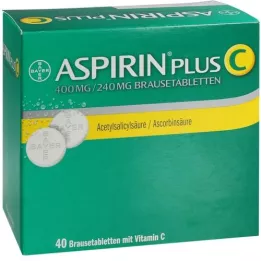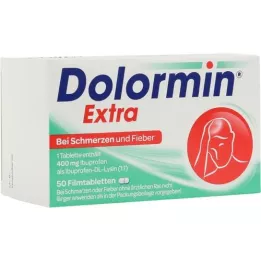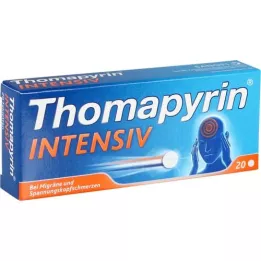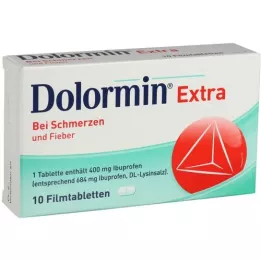RATIOPYRIN painkillers, 20 pcs
RATIOPYRIN Schmerztabletten
Manufacturers: ratiopharm GmbH
PZN: 07686182
Dosage: Tabletten
Content: 20 St
Reward Points: 51
Availability: In stock
$8.63
$4.70
from German pharmacies to your address
Instructions for use for RATIOPYRIN painkillers, 20 pcs
ratiopyrin® painkillers
Application areas:
For adults and adolescents from the age of 12: acute light to moderately severe pain.
Note: Pain relievers should not be used for a long time or in higher doses without questioning the doctor.
Warnings:
Do not apply longer for pain or fever without medical advice than specified in the package insert! Tablets contains lactose! Pharmacy.
Read the package supplement and ask your doctor or pharmacist for risks and side effects.
4/22.
Detailed instructions for RATIOPYRIN painkillers, 20 pcs
Field of use
- This drug is a pain relieving, fever-lowering and anti-inflammatory drug (non-steroidal anti-inflammatory/analgesic; a combination of acetylsalicylic acid, paracetamol and caffeine).
- It is used for adults and adolescents from the age of 12 with acute light to moderately severe pain.
Active ingredients / ingredients / ingredients
250 mg acetylsalicylic acid
50 mg caffeine
200 mg paracetamol
Lactose 1-water auxiliary substance (+)
Lactose auxiliary substance (+)
Corn starch auxiliary substance (+)
Stearic acid auxiliary material (+)
Talcum auxiliary material (+)
Contradictions
- The medicine must not be taken
- if you are allergic to salicylates, paracetamol, caffeine or one of the other components of this medicine
- if you have in the past to apply salicylates or other non-steroidal inflammatory inhibitors (certain remedies for pain, fever or inflammation) with asthma attacks, nasal mucosal swelling (nasal polyps), swelling of the face, tongue, larynx (angio edema) or rash
- in the case of gastric and intestinal ulcers
- in the case of liver and kidney failure
- in the case of heavier cardiac muscle weakness, not adjustable by medication (heart failure)
- with pathologically increased bleeding tendency
- if you take 15 mg or more methotrexate per week at the same time
- in the last three months of pregnancy
- of children under the age of 12
- from young people aged 12 and over with chickenpox or flu-like diseases, since there is a risk of developing Reye syndrome.
- In cases of rare congenital intolerance to one of the auxiliary substances, the painkillers should not be used.
- Excessive absorption of caffeine (e.g. in coffee, tea, food and other medicines and drinks) should be avoided while taking it.
dosage
- Always take this medicine exactly as described in this package insert or take precisely after instruction from your doctor or pharmacist. Ask your doctor or pharmacist if you are not sure.
- Unless otherwise prescribed by the doctor, the usual dose is:
- Adults and adolescents from the age of 12
- Once dose: 1 - 2 tablets (corresponding to 250 - 500 mg acetylsalicylic acid, 200 - 400 mg paracetamol and 50 - 100 mg caffeine)
- Maximum dose per day (24 hours): 6 tablets (corresponding to 1,500 mg acetylsalicylic acid, 1,200 mg paracetamol and 300 mg caffeine)
- The maximum dose per day (24 hours) should not be exceeded, and the time interval up to the use of the next tablet should be 4 - 8 hours.
- Adults and adolescents from the age of 12
- Duration of the application
- The painkillers should not be used for more than 3-4 days or in higher doses without medical or dental advice.
- Please speak to your doctor or pharmacist if you have the impression that the effect is too strong or too weak.
- If you have taken a larger amount than you should
- In the event of an overdose, nausea, vomiting, loss of appetite, pale and abdominal pain, but also dizziness and earlades can occur. Despite improvement in general condition on 2. Day can lead to progressive liver damage up to the liver coma on the 3rd day.
- Overdosing or long-lasting chronic application can lead to severe liver damage, CNS disorders such as headaches, dizziness, vomiting, earlades, visual or hearing disorders as well as iron deficiency anemia, disorders of the acid-base balance and kidney damage. Early symptoms of acute caffeine poisoning are usually trembling and restlessness. Symptoms of poisoning through caffeine (nausea, vomiting, reduced potassium blood level, blood sugar increase, central nervous symptoms, cardiovascular reactions up to myocardial damage) can also occur in a short time when there is a short time.
- As further possible symptoms of acute poisoning, blood sugar drop (hypoglycemia), rash as well as gastrointestinal bleeding, hyperventilation and confusion can appear. In the event of severe poisoning, deliriums, tremors, shaking cramps, shortness of breath, sweating, loss of fluid, increase in body temperature and coma can occur.
- There is an increased risk of poisoning, up to fatal outcome, for older patients, children, patients with liver diseases, chronic alcohol consumption or chronic error nutrition as well as patients who also take medicinal products that can lead to liver damage.
- If an overdose is suspected, you immediately notify a doctor - even with temporarily declining symptoms - and fail to take any further medication.
- If you have forgotten the intake
- Do not take the double amount if you have forgotten the prior intake.
- If you have any further questions about the application of the drug, please contact your doctor or pharmacist.
Taking
- Take the tablets either dissolved in some liquid or incorporated with plenty of liquid.
- Taking it after meals can lead to a delayed occurrence.
Patient information
- Warnings and Precautions
- Please speak to your doctor or pharmacist before taking the painkillers,
- with simultaneous therapy with anticoagulant medicines (e.g. cumarine attendants, heparin), thrombolytics or certain antidepressants (selective serotonin reuptake inhibitors, SSRI)
- with asthma bronchial, hay fever or nasal mucosa swelling (nasal polyps)
- in the case of hypersensitivity (e.g. skin reactions) against other inflammatory inhibitors/anti-inflammatory drugs (so-called analgesics intolerance/analgesic asthma) or other allergens
- in chronic or recurring stomach or intestinal problems
- for gastrointestinal ulcers in the past, gastrointestinal bleeding or breakouts
- for kidney dysfunction or pre -damaged kidney
- for liver dysfunction (e.g. by chronic alcohol abuse or inflammation of the liver)
- with glucose 6 phosphate hydrogenase deficiency
- in Gilbert syndrome (Meulengracht disease)
- before operations
- in the case of overactive thyroid (hyperthyroidism)
- If the recommended dose is exceeded, liver damage can result. In order to prevent the risk of overdose, it should be ensured that the drug used at the same time does not contain paracetamol.
- The highly dosed, non -intended long -term use of pain relievers can increase the risk of progressing the disease if the kidney damage is pre -existing.
- If painkillers are not dosed for a long time, headaches can occur, which may not be treated by increased doses of the drug. In such cases, no further use of the pain reliever may be taken without medical advice.
- When stopping abruptly, headaches and fatigue, muscle pain, nervousness and vegetative symptoms can occur after a long -dosed, non -determined use of painkillers. This deductible symptoms subside within a few days. Until then, the re -accepting of painkillers should be omitted and the re -occupiede does not take place without medical advice.
- At the first sign of a hypersensitivity reaction after taking, the therapy must be canceled.
- Acetylsalicylic acid reduces uric acid excretion in low doses. In the case of preloaded patients, this may trigger a gout attack.
- The painkillers can cover the signs of infection. If signs of an infection (e.g. reddening, swelling, overheating, pain, fever) occur or worsen, the doctor should therefore be consulted immediately.
- Due to the fever -lowering effect, an improvement in the disease can be faked.
- If necessary, medical advice must be obtained.
- Effects on the gastrointestinal tract
- A simultaneous use of acetylsalicylic acid with other non-steroidal inflammatory inhibitors, including so-called Cox inhibitors (cyclooxygenase-2-inhibitors), which, among. be used against rheumatic symptoms must be avoided.
- In older patients, side effects occur more after using non-steroidal inflammatory inhibitors, especially bleeding in the stomach and intestinal area that can be life-threatening.
- Bleeding, ulceration and breakdowns (perforations) in the gastrointestinal area that can lead to death was reported in connection with the intake of all non-steroidal inflammatory inhibitors. They occurred with or without previous warning symptoms or with the gastrointestinal tract without serious events in the history at any time. The risk of this is increased with increasing NSAR dose, in patients with ulcers in the history, especially with the complications bleeding or breakthrough and in the elderly. These patients should begin treatment with the lowest available dose. Combination therapy with gastric mucosal-protecting medicines (e.g. misoprostol or proton pump inhibitor) should be considered here. This is also recommended for patients who take other medicines who increase the risk of a disease of the stomach intestinal tract.
- Patients, especially at older age, who have a history of side effects on the stomach intestinal tract, should report any unusual symptom in the abdomen, especially at the beginning of the therapy.
- Caution is required in patients who also take medicinal products that increase the risk of ulcers or bleeding, e.g. B. corticoids, anti-blood clotting medication such as warfarin, selective serotonin reuptake inhibitors, which, among others,. are prescribed for the treatment of depressed moods or thrombocyte aggregation inhibitors.
- Treatment must be canceled when bleeding or ulcer formation occurs in the gastrointestinal tract.
- If the black chair (TEERSUFL) occurs, the doctor must be notified immediately.
- Children and adolescents
- The painkillers are said to be feverish illnesses due to the proportion of acetylsalicylic acid in children and adolescents, e.g. B. also chickenpox, only on medical instructions and only applied if other measures do not work. If these diseases occur with long-lasting vomiting, headache or impairments of consciousness, this can be a sign of Reye syndrome, a very rare, but etc. life-threatening illness, which is absolutely necessary for immediate medical treatment.
- Please speak to your doctor or pharmacist before taking the painkillers,
- Wateriness and ability to operate machines
- There is no impact on the traffic or operating machines as a result of intake.
- If you find side effects such as sleepiness, visual disturbances, dizziness or equilibrium disorders, you should not carry a vehicle and do not operate machines.
Pregnancy
- If you are pregnant or breastfeed, or if you suspect that you are pregnant or intend to become pregnant, ask your doctor or pharmacist for advice before taking this drug.
- Pregnancy
- The painkillers should not be taken during pregnancy, since the pregnancy and/or development of the unborn child is reducedcan be raised. During the 1st and 2nd third of the pregnancy, you should therefore only take the painkillers if necessary after consultation with the doctor or dentist and only in the least effective dose of possible time for the shortest, since there are indications of an increased risk of miscarriages and malformations . The same applies to women with desire to have children.
- In the last three months of pregnancy and during birth, painkillers may not be used, since there is an increased risk of complications for mother and child.
- Notice:
- If pregnancy is determined during taking the preparation, the doctor must be informed.
- Breastfeeding
- The active ingredients pass into breast milk. The condition and behavior of the infant can be affected by caffeine recorded with breast milk. If the recommended dose is used in the short term, an interruption of breastfeeding will generally not be necessary. If higher doses are used for longer or taking higher doses.
- Reproductive ability
- Acetylsalicylic acid belongs to a group of medicinal products (non-steroidal anti-rheumatics) that can affect female fertility. This effect is reversible after stopping the drug (reversible).
Hints
Miscellaneous
- The habitual taking of painkillers is dangerous. It can lead to irreparable damage to health. In general, the long-term taking of painkillers, especially when combining several pain relieving active ingredients, can lead to permanent kidney damage with the risk of kidney failure (analgesics-nephropathy).
- The long -term use of the combination of the active substance can lead to an increased risk of disease for damage damage caused by pain relievers if the kidney damage or genetic assessment is pre -existing.
- In the case of long -dosed, non -determined use of pain relievers, headaches and tiredness, muscle pain, nervousness and vegetative symptoms can occur. This sounds within a few days. Until then, painkillers will be reinforced and re -taking it again should take place without medical advice.
- When taking surgical interventions, the doctor/dentist must be questioned or informed.
- If the black chair (TEERSUFL) occurs, the doctor must be notified immediately.
- If the recommended dosage is exceeded, the liver values (transaminases) can increase. Therefore, regular control of the transaminases, especially in children, is required.
Medicines Reviews
Write a review
Related Products

IBU-LYSIN Double -heartpharm 400 mg film -coated tablets, 50 pcs
IBU-LYSIN DoppelherzPharma 400 mg Filmtabletten
$19.62 $22.90
Popular in Headache
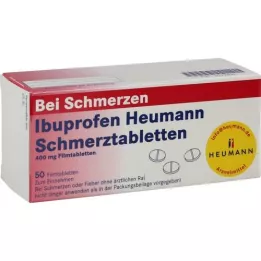
IBUPROFEN Heumann painkillers 400 mg, 50 pcs
IBUPROFEN Heumann Schmerztabletten 400 mg
$7.15 $14.29
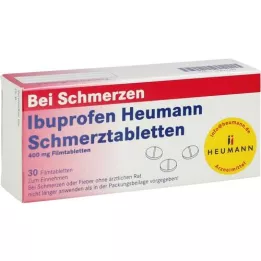
IBUPROFEN Heumann painkillers 400 mg, 30 pcs
IBUPROFEN Heumann Schmerztabletten 400 mg
$5.65 $8.79
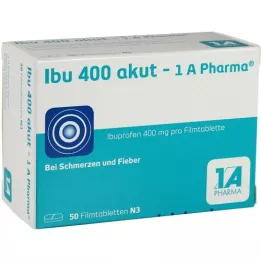
IBU 400 Akut-1a Pharma film-coated tablets, 50 pcs
IBU 400 akut-1A Pharma Filmtabletten
$5.54 $12.34
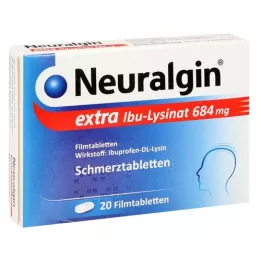
NEURALGIN Extra IBU-Lysinate film-coated tablets, 20 pcs
NEURALGIN extra Ibu-Lysinat Filmtabletten
$8.47 $13.26




